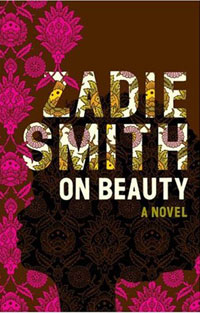| ||
Comic academia by Joe Foster On Beauty by Zadie Smith. Penguin Books 2006, 464 pages. The futility of academia” is kind of a pet rant of mine. I know a guy who is one physical education class short of a bachelor’s degree. Basically, he won’t be considered educated until he goes bowling. One could argue that he should just take the class and be done with it, but you have to admire that he flatly refuses to play their silly bureaucratic game. To wit: a person majoring in English can’t graduate until he or she takes Spanish; another person is forced to take a survey class, in which the daily lesson plan consists of, “OK you guys, let’s get into small groups and talk about what you read last night;” getting your grade docked for attendance for a class that you’re paying to take; and the ridiculous nature of an open-book test, as much as we all appreciated those. Then there’re the things that people really seem to care about way too much to be taken seriously: the chemical composition of Spam, whether or not J. Alfred Prufrock ever got laid, “The Matrix” from a Marxist perspective and a study of the Nerf market strategy. My, oh my. Howard Belsey, one of the characters in Zadie Smith’s On Beauty, is a Rembrandt scholar who thinks Rembrandt sucks and has basically devoted his life to proving it. Short-listed for the Man Booker, and winner of the Orange Prize for fiction, On Beauty is an incredibly well-rounded tale of politics, race, love, lust, classism, self exploration and of course, academia. Smith’s strength is in elegantly juggling strong and developed characters with a complex plot. Really, the characters are the very best part of this book; each is complicated, their motivations often unknown even to themselves.
Probably my favorite character is Levi, Howard Belsey’s youngest son. Howard is white, English, and his wife, Kiki, is black. Levi’s mixed-race blood and upper middle-class upbringing is a source of embarrassment, as he tries to be as “street” as possible. In high school, he starts working with a group of hustlers selling hot merchandise and hitting a weekly spoken word poetry slam, where they rap about America’s involvement, or non-involvement, in Haiti. Levi attempts to befriend a fellow hustler, a Haitian that sees right though his act and gets confused when Levi “drops by” his small apartment with gifts of food. This obsession eventually develops into a well-meaning but misinformed and politically motivated art theft. Levi’s older brother Jerome is an awkward kid trying to be Christian in a family of liberal atheists, and their sister Zora is that annoying girl who sits in the front of class and argues with professors about her grades. Howard’s arch-nemesis is a black English conservative and fellow Rembrandt scholar named Monty Kipps. His smoking hot daughter breaks Jerome’s heart, while his frail wife befriends Kiki. These two families clash in a battle of ideologies, jealousies and awkward sex that keeps the reader guessing as to what kind of embarrassing interaction is coming next. It’s great. The tension is physically present in every interaction between every character; nobody is really comfortable with anyone else in any circumstance, and Zadie Smith does a superb job of getting right to the core of what is going on in each relationship. Despite the discomfort and awkwardness, there are still fits of hilarity and sweetness that might make these relationships worth maintaining. Some touching moments between siblings before their own lives sweep them back away from each other, a secret smile between spouses when guests make asses of themselves at a party, and Howard’s apparent fear of glee clubs, and because of his job, his inability to avoid them. Definitely the funniest scene in the book is when his “date” doesn’t take him seriously when he insists he cannot go to a function where a glee club is performing. He’s basically OK with the barbershop variety, with their sways and occasional winks, but the other type, the type that coordinate spins and turn U2 songs into sambas, with the fat guy with the deep bass smiling maniacally, he just can’t help it. He laughs so damn hard at them that he gets kicked out of any function at which they “perform;” great squeaky peals of booming laughter drowning out the singers. Others at the function think he’s rude, but he can’t help it, and you have to admit, the guy’s got a point. Maybe the “moral” of the book can be boiled down to this point: sometimes we all have our reasons for behavior that others see as inappropriate. On Beauty may also be a modern mirror-like comedy of manners of sorts, each character bungling past the other, spreading discomfort and riled feelings in their wake. •
|
In this week's issue...
- May 15, 2025
- End of the trail
Despite tariff pause, Colorado bike company can’t hang on through supply chain chaos
- May 8, 2025
- Shared pain
Dismal trend highlights need to cut usage in Upper Basin, too
- April 24, 2025
- A tale of two bills
Nuclear gets all the hype, but optimizing infrastructure will have bigger impact


